From the left: Masaki Yamamoto (ChatWork CTO), Toshi Yamamoto (ChatWork CEO), Tomohiro Miyasaka (GMO VenturePartners), Masayuki Yamaguchi (ChatWork Board Member)
Slack, the popular workplace communication and collaboration startup has raised $160 million at a post-money valuation of $2.8 billion recently. The startup is backed by star investors including Accel Partners, a16z, Google Ventures, KPCB, DST, and Index Ventures. This A-list of top tier investors reflects the trend indicating that the corporate messaging app market is getting hot.
Do you know which Japanese startup, regarded as a pioneer in the market and described as the WhatsApp/WeChat/LINE for business?
The answer is ChatWork, a corporate messaging app used by more than 66,000 companies in 183 countries.
ChatWork was a profitable, self-funded startup for over ten years but in April 22, 2015 they announced the company’s first fundraising.
GMO VenturePartners decided to back the popular corporate messaging app startup with an investment of 2.5 Million US Dollar.
In April 14, 2015 GMO VenturePartners got an opportunity to talk to three board members of ChatWork that has a strong influence in the growth of the app. We decided to ask four questions; 1.About the launch of ChatWork 2.Why did self-funded ChatWork decided to raise money? 3. What is the differentiation against global competitors? 4.How to globally expand from the base in Silicon Valley?
The Launch of ChatWork
Miyasaka: You were managing a profitable company for over 10 years. Why did you decided to start ChatWork?
Toshi: When I first started my company in 2000, we were able to make a profit by developing an affiliate and SEO analyzing tool. Through these profits we were able to strengthen our company. As our first core project, we decided to develop a web analytics tool with a freemium model that was meant to disrupt Google Analytics. However, we couldn’t make a profit out of this product and this was our first big failure.
After we failed our challenge, we decided to calm down and stopped developing new web services. And as a company, we decided to focus on a web tool sales agency. We became a technology consultant and were suggesting implementation of new technology for small/medium size companies to make operation within the company more efficient. Actually, we were making decent revenue out of this business but I was never satisfied since I had a strong passion in supporting small companies that is struggling to implement new technologies. However, most of our clients were advanced, early adopters. Not only that, our core business of selling and supporting implementation of combination of multiple web tools were getting too complicated for small/medium sized companies. I finally realized it is impossible to succeed my passion by selling other companies’ tools.
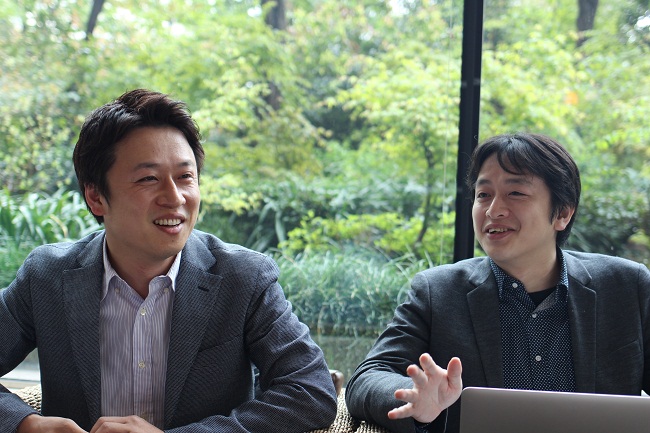
—またGoogleと戦うのかと。前自社でつくったサービスはGoogle Analyticsと戦って散々だったので(笑)
Masaki: We had a discussion for our new product and we decided to replace a tool that we were fully engaged in. After few talks we came to a conclusion that we were mostly addicted to Skype’s Chat. We were so addicted that without Skype, we weren’t able to operate our company. However, it was very hard to implement Skype to other companies since we were using it in a very complicated way. Since Skype is unable to send a message when it is offline, we made a Skype account that is online 24/7 to send and receive new message and made it our message-stocking server by adding that account to all group chats. This was very efficient, but since there were many rules and techniques to operate Skype, it was too complicated to implement this to other companies.
We decided to make a web service that tackles this problem. We were very lucky that new technology came out to support real time communication and it made it easier to develop a messaging service. Thanks to this technological breakthrough, we decided to develop an Internet-based business messaging service. We also focused on problem of user experience to use Skype for a business purpose such as addition of “Task Management” function. Through this analysis, we decided to focus on a “Messaging” and “Task Management” for our new product.
In the beginning, members of our company didn’t believe about this new service. Google has launched a new messaging service called Google Wave and everyone thought Google Wave will become an email killer. We were also afraid of competing with Google since it reminded us about our Web Analytics service (laugh). But when I first tested Google Wave I thought this doesn’t disrupt a messaging service (and Google Wave ceased operations later).
Toshi: Since we were focusing on operation efficiency by installing new web tool solutions, we already had a list of early adopters. We were teaching over hundreds of companies to use these tools, including Skype, on a weekly basis using Ustream. Most of our clients had a problem using Skype, so when showed ChatWork during the lecture most were very excited about it. This gives me a strong confidence in the product and I decided to launch this product by 2010 of March 1st.
Masaki: At the beginning, I was the only engineer that was assigned in this project, but then the CEO assigned me two more engineers. Even with two additional engineers, I couldn’t sleep until the day of the launch. One of the hardest parts of development was when Toshi decided to add a paid version of the product from the beginning. One of the reasons that we failed for our first product was the failure to acquire paid users. A month before the launch, we developed a closed beta version to receive feedback from our current clients.
When we launched our product at March 1st, 2011, there were about 50 to 100 users registering per day. However, when Gizmodo wrote an article about ChatWork, there were over 20 to 30 users registrations per minute. Currently, we have over 600,000 users using the product, and we are doing very well in terms of paid user registration comparing to other global competitors.
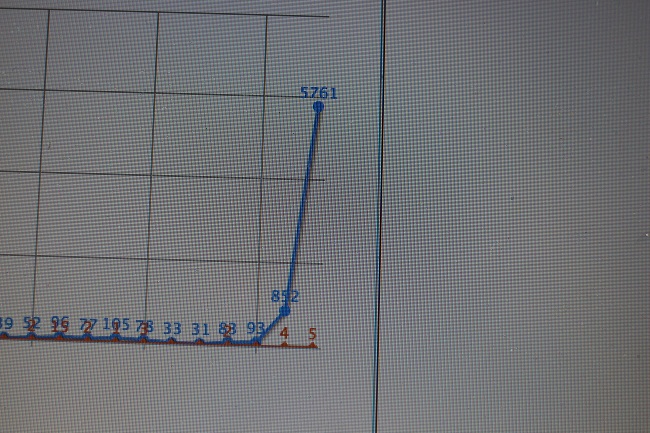
—1分に何十件とか、凄まじい勢いでサインアップがありました。 ※ギズモードに記事をだした際の一日の純増数のグラフの推移
The Reason ChatWork Decided to Raise Funds
Miyasaka: You never thought of fundraising before?
Toshi: We never thought about fundraising before December of 2014. We had corporate rules called “14 Things We Don’t Do”. It included not doing anything that didn’t involve Internet, no IPO, and no outside investment to protect our employee etc. We had received contact from many VCs but I had been never interested in the investment. We had a strong policy to remain as a small/medium sized company to understand more about our users. So we purposely decided to limit the number of employees to 40 until we make over 14M USD in revenue.
I have a strong vision that technology should be used to empower weaker people such as small/medium sized companies or housewives. I also wanted to prove that small/medium-sized company could compete with big companies. I wanted to empower small/medium-sized company by competing with big companies as a small/medium sized company.
Miyasaka: With such a strong vision, why did you decided to fundraise?
Toshi: I stayed at Silicon Valley for 2 ½ years and I learned Silicon Valley’s style of managing the company. At first, we were thinking of compete as a self-funded startup, but with limited money we couldn’t grow fast especially in terms of hiring new people. Our company was profitable for the past fourteen consecutive years and we had a strong policy of hiring new employee after we make our profit. Because we managed the company like this, we lost many opportunities to hire star players, since we needed to wait until we make a profit until we hire new people. We were very slow in our hiring process.
We were providing an operation efficiency solution using a chat tool for past ten years, and we understand the roadmap of the future of business communication service, but I thought I would regret it if we can’t move forward because of that corporate rule. Not only that, I didn’t want to disappoint our users.
We already have a great product with teams with great ideas and had a strong first-mover advantage. With American competitors entering this market I questioned myself, do I want to lose in this competition? I think we can grow gradually without fundraising, but if we continue working in this speed I thought ChatWork would only become a small trend in Japan. I thought this goes against our vision, a “Global Product from Japan”, so we decided to consider about investment from December 2014.
If we have capital, we can accelerate our hiring process and hire more engineers. And it leads to improvement of our product which connects directly to the users’ benefit. More users, more revenue, and it will lead to investors’ satisfaction. By receiving capital, I started to picture the world that makes all stockholders including employees, users, and investors satisfied.
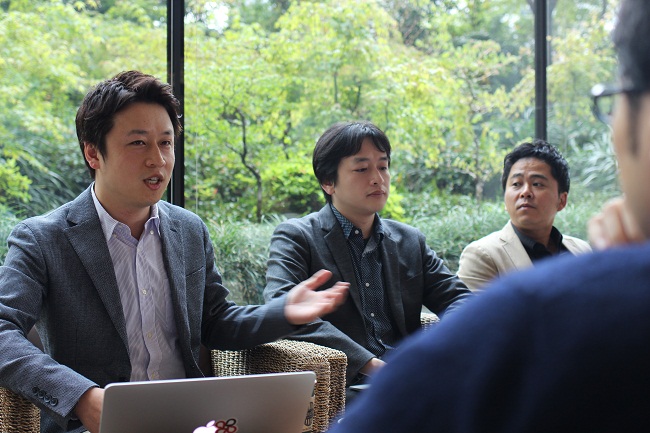
—「しないこと14箇条」ということを社内のルールとして決めていて、インターネットを使わないことはしない、社員第一主義で、他人資本はいれない、上場もしない
Miyasaka:Why did you decide on us as an investor?
Toshi: We talked with over ten investors. Since this was our first fundraising, we had to learn from zero. I had strong confidence in my product so I think we will be successful on raising money, but I just didn’t know anything about the process. I didn’t know what valuation and Corporate Venture Capital meant in the beginning. I also didn’t know the difference between Corporate Venture Capital and Venture Capital, which is a subsidiary of banks or security companies. Every time when I had a talk with a VC I always focused on the specific themes. For instance I was always thinking, what do investors want from us? How can they support us? Is it good to have a lot of investors or just a limited number of investors? I always learned something new after each meeting.
From our impression, we thought investors were questioning our product in the beginning. Investors are very conservative since they don’t know anything about our company. After a few conversations, usually investors are very satisfied with our product and in the end they usually want to invest in our company at around one million USD.
In the end, all investors wanted to invest in our company and we were able to choose an investor that matches us.
I met GMO VenturePartners late January by introduction from Mr. Tsuji, the CEO of Money Forward. My schedule was pretty tight because it was right before the date that I was going back to the States. Fortunately, I was able to arrange the time with Mr. Miyasaka for about 30 minutes.
Toshi: Since we only had 30 minutes, I was kind of worried if we have enough time to explain about our product. Surprisingly Mr. Miyasaka said, “We don’t have enough time and I don’t like being indirect, so let me invest in your company!” His straightforwardness made me happy from the beginning.
Toshi: That was very shocking. Most investors seem very conservative and ask many questions as possible and in the end they usually get very interested. Mr. Miyasaka looks very calm and clever but I liked his hot-blooded attitude when he said, “ I am very interested in your company.” I liked his attitude, and thought his personality will match our company and he will commit to make our company grow faster. Choosing investors is very similar to when I hire people as a CEO. Even if that person has great skill, there are those kinds of people that is hard to work with. In the case of Mr. Miyasaka, it was the exact opposite and I actually wanted to work with him.

—「時間も無いことですし、もうまわりくどいの嫌だから言わせてください。入れさせてください!」って。あれ、このひと関西人かな?って(笑)
Miyasaka: At the time, I couldn’t tell that we were fundraising for the new fund so I couldn’t promise how much money we can invest. If we are investing I would like to support strongly, and I wanted to invest in this company from beginning, so I committed early.
For the amount, it depended on the fundraising, but in the end I told him 300 million yen ($ 2.5M). I was very happy about it.
Before this investment, we always co-invested with other investors and invested several thousand dollors, so this was a new challenge for us.
Toshi: I was very happy when they said that this was a huge risk for them. It was a large capital and it was the first portfolio for the new fund. So I would imagine that they would commit fully to our company to make it successful.
In addition, I would like to have support from GMO Internet Group’s network and we would like to get Mr. Ryu Muramatsu to support us for expansion to the South East Asia.
(Most of the conversation about this investment was taken in the US, Singapore, and Tokyo; And all of these conversations were done very efficiently using ChatWork. The below is the picture of Toshi Yamamoto CEO, when during the video meeting got a flat tire while he was going back to his house.)
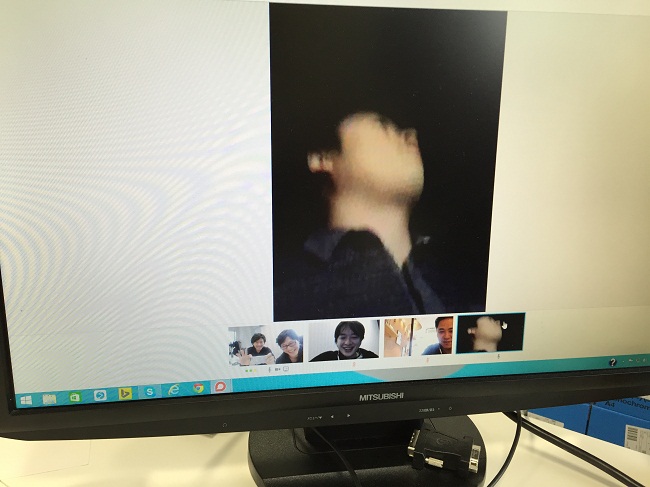
(The below is the picture of ChatWork Live, everyone handshake after the negotiation succeeded.)
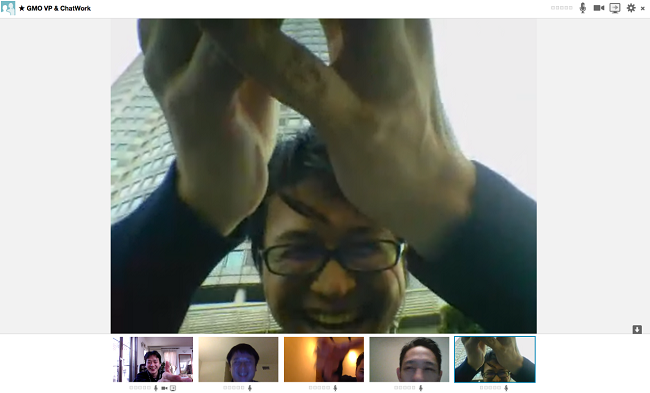
Competition with Global Competitors
Miyasaka: Business communication tool is a very hot market, but where do you position your company?
Toshi: After LINE, WeChat, and WhatsApp became popular in the tech world, many competitors have entered the business communication market. I think this is very illogical. Many competitors has entered this market, and many investment money and people has entered this market, but we have a strong vision to change how people work, have something we have focused over ten years, and I have strong confidence in my plan.
Before I developed ChatWork, we have told many companies that you can work in a very efficient way by using multiple products. By installing these solutions, it costs a lot of money and many small/medium sized had a trouble implementing these solutions. I developed ChatWork to break through all of these obstacles.
First of all it’s free, and even the paid version is very cheap and it’s even easier than mail. It’s efficient to all companies that use email.
I wanted to make a product that changes your world by implementing that product. You don’t have to think how to operate this product in an efficient way. For instance, if you use Gmail, even a person with low technology literacy wouldn’t have the problem of not finding an email. I wanted to make ChatWork so that when you use ChatWork, a company becomes very efficient.
Miyasaka: How do you differentiate your product with Slack?
Toshi: Slack is for engineers and for early adopters that is interested in new technologies. It’s a strong replacement of business chat tools like HipChat. ChatWork however, is for people with low technology literacy and no interest in new technologies. It is difficult to make these people use our tool, but the lifetime value will be very high once they start using our product. It’s hard in the beginning but eventually it will be profitable later. Engineers will be happy if you use development tool for an engineer, but this differs from our vision. I want to develop a product that makes everybody’s, especially non-engineers, work style very efficient. I want to shout out that ChatWork will make everybody’s work style efficient! Our target is different from Slack.
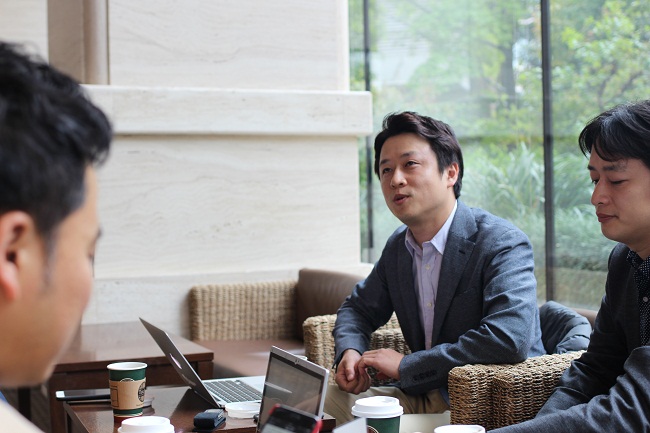
—エンジニア集団がつくると、エンジニア向けに喜ばれるツールになっちゃうんですけど、うちはそうじゃない
The Base in Silicon Valley
Miyasaka: Toshi lives in Silicon Valley, but what is the benefit and reason for living in Silicon Valley?
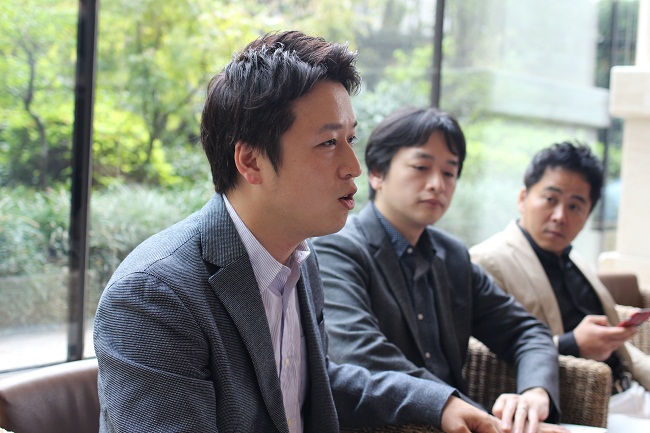
—世界に既にあって日本市場だけ狙うサービスは作らない、とリサーチを徹底的にしました。
Toshi: After I started my own company in year 2000, I was studying abroad in the US and Silicon Valley was always on my mind. When I visited Silicon Valley in 2005, I promised myself that I will compete in this market and I wrote it on a piece of paper.
In 2010, when my company was around thirty people and became profitable, our company was maturing. And when we were making our own product I promised to myself that we would develop the product that can compete in the global market. I wouldn’t like to copy a product in the global market and localize it to the Japan market. So I researched a lot and developed ChatWork. We released it in March 2011, and on June 2011, I made a presentation about my product. We had offers from investors, but we only wanted users from the US and weren’t interested in the money, so I declined the offers. In 2011, I wanted to operate my company bootstrapped. The user registration for the English version of ChatWork didn’t grow, so I concluded that the reason why it wasn’t growing because I don’t know how people in the US think and work. So I decided to move to the US in 2012.
Miyasaka: Is there any other market would you like to focus? Asia, for instance? Were you able to see those markets by staying in Silicon Valley?
Toshi: If you only stay in Japan, you couldn’t understand the local demands. For example, Samsung were successful for selling a locked refrigerator in India. Panasonic couldn’t make that product. In India, if you don’t have a lock, the food will be stolen. Most of Samsung’s employees are forced to go to many different countries for a year and their only mission is to localize their own mind and learn about the potential demands. By doing this, they learned the importance of the lock in the refrigerator and became a big hit .
These are the perspective you don’t have when you only stay in Japan. But I guess it’s very understandable when you hear about this story. I learned the importance of local demands by living in Silicon Valley. When we expand to Asia, I think it’s important to localize depending on the local demands. For instance in Taiwan, gray color gives a negative impression since it makes people imagine a funeral. These kinds of demands are hard to learn by only staying in Japan.
By staying in Silicon Valley, we can ally with a local partner and optimize the product for global expansion.
(The below is the picture when Ryu Muramatsu from GMO VenturePartners was visiting ChatWork’s US office.)
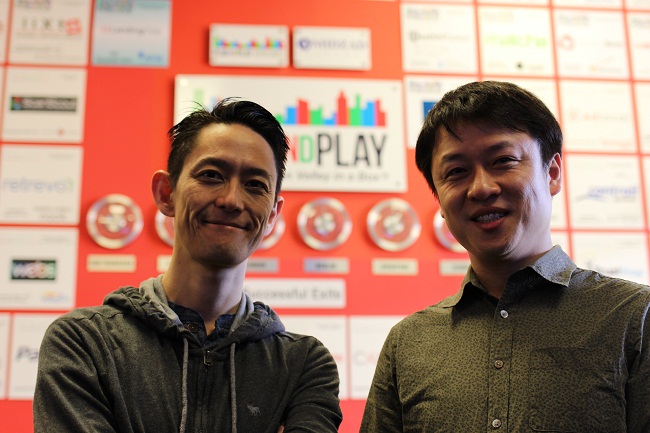
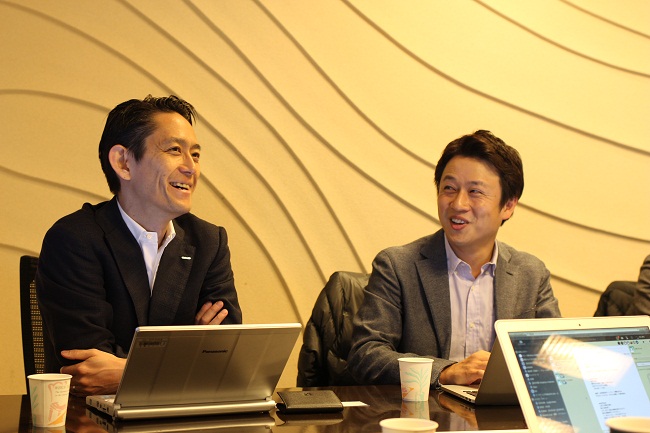
— ChatWorkさんを特に高く評価した点は8つありますが(笑)、
一番は、「スカイプを超える規模を狙える」点。
GMO VenturePartners will support the comapanies going global from Japan with our whole energy.
